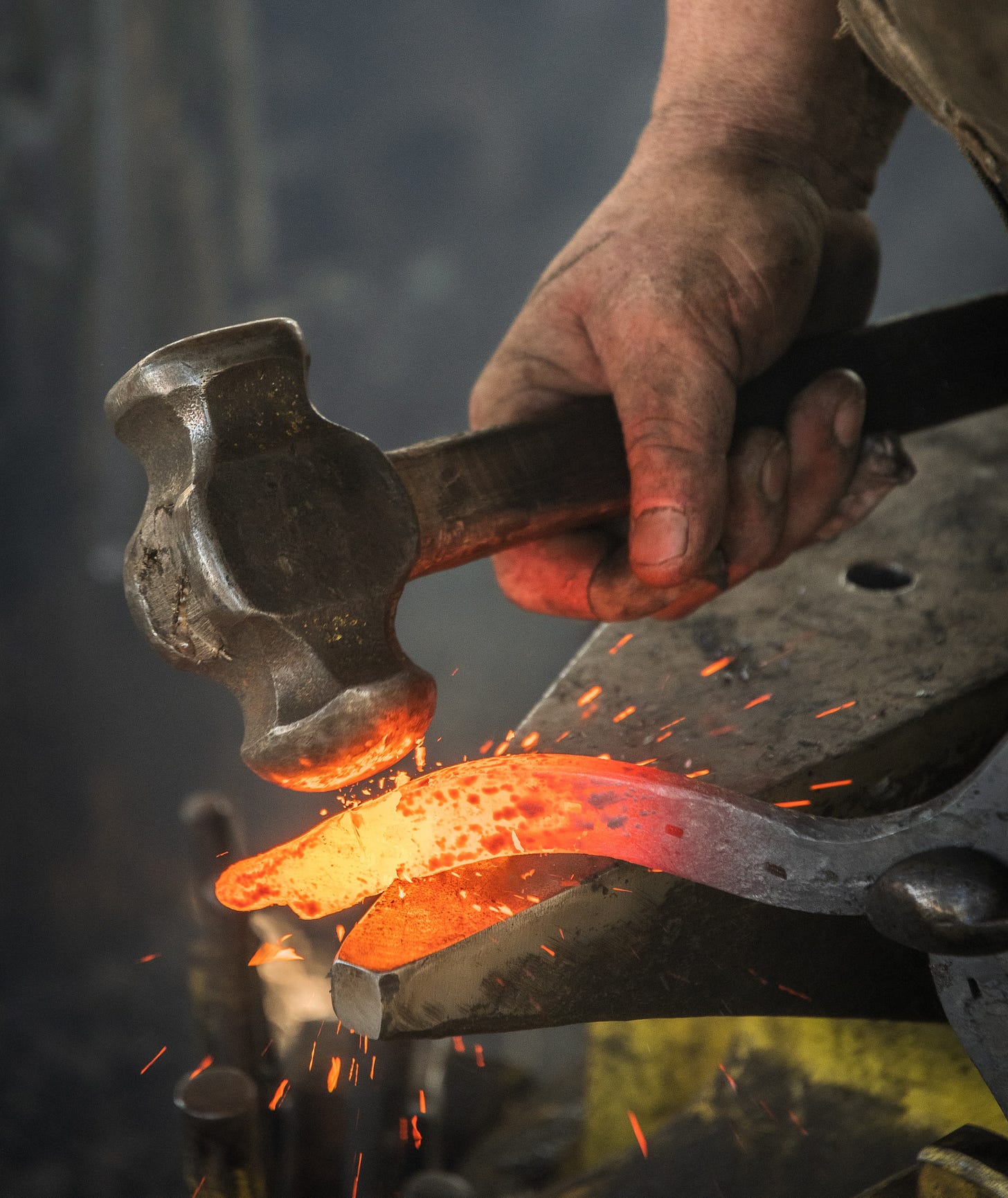The Master and the Apprentice
“He will be introduced to excellence. Not the theory, but the practical methods, details, sweat and blood necessary to create an outcome without spot, blemish, or imperfection. To learn the satisfaction that is only felt when having done so.”
Imagine a time during the 1700s. A master craftsman has selected a young lad to begin working in his shop. He will become an apprentice. He will endure a training regimen that will develop him from a young boy into a master craftsman like his mentor.
The process will take years. That’s right, years. It’s inconceivable that anyone in our current culture would voluntarily endure the level of patience and hardship necessary in that culture to invest in and develop a young man into something usable and worthwhile.
Once the lad begins, he will be expected to do whatever the seemingly tyrannical master requires of him. The tasks are never lofty. Rather, he will be tasked to do only the menial, most subservient chores, such as cleaning the stables, the shop, and to do the bidding of the other workers – for years.
A yearning to use a tool instead of a broom grows within the apprentice. Staying mindful of his duties lest he earn a severe scolding, he watches from a distance as the master works with care and detail, intricately creating a product with a skill that had been invested in him long ago. The lad knows that his time will come, but never soon enough. He watches the other workers labor at their tasks with dutiful focus, creating items with no blemishes, balanced symmetry, and with expected perfection.
If the apprentice is faithful, the master will give him new responsibilities. Each step is monitored for accuracy, with no praise for any task correctly done but sharp rebuke for anything less than perfect. He will make many mistakes and be scolded frequently. Yet the apprentice remains in that repressive setting, enduring what he is given.
Why does he voluntarily subject himself to that environment? Because he understands the metamorphosis that will occur one day; the temporary hardship that he endures now will enable him to acquire a lifelong skill that will serve him the rest of his life. It will provide for his future wife and children. It will become the thing for which he is known.
Nor does he discount the intangible values that will be seeded, developed and birthed in him. He will be introduced to excellence. Not the theory, but the practical methods, details, sweat and blood necessary to create an outcome without spot, blemish, or imperfection. To learn the satisfaction that is only felt when having done so. To know that the outcome isn’t compared to anyone else, but against the standard developed in him, and that it will set him apart, set him above, and be the foundation for his reputation, one based on merit and substance.
After many, many years, he will become the master craftsman, with his own shop, and his own apprentices that he will scold, humiliate, nurture, train and equip. The shingle that hangs outside his door will have his name chiseled, just above the words “Master Craftsman.”
His reputation will be known. Everyone in the village will know him, and know of him, whether he is fair, steadfast, consistent, dependable and a man of his word. Many years later, after fulfilling his purpose, he will become too feeble to continue his work and eventually be replaced by someone who has served him with excellence. The shingle will have a new name, but the legacy of his work will continue for as long as his product lasts, and his apprentices continue working according to his standard. Perhaps, after hundreds of years, a piece, noted specifically for his characteristic style, will appear on a televised antique show and be appraised as priceless. A legacy of quality and excellence always appreciates.
Consider the time and culture of the period examined. It was an arduous life and work environment. Only rudimentary tools were available, there was little warmth in drafty buildings during the winter and no cooling in the sweltering summers, almost non-existent communication, and no “Craftsmanship for Dummies” books. Despite the countless difficulties, the ideals and values that governed their ethics produced quality and excellence.
Our culture has changed. Apprentices aren’t subjected to the travail of yesteryear. In fact, the trades, the laborers for carpentry, electricity, roofing, drywall, painting, flooring, landscaping, and so forth, might attend a trade school or be trained by their employer. Both avenues spawn more self-employed businesses than any other because of the ease in doing so. A young hire learns a craft well enough to start his or her own business, and does so, sometimes all within a period of a year.
The result is obvious. Impatient employees, eager to catch a piece of the American dream, go solo without the necessary skill set to adequately satisfy customers’ needs and become hostage to their own business management naivete. But also missing are the invisible character traits, including experience and wisdom that, had they been better developed, would otherwise rudder their skill and business aptitude toward better outcomes – for themselves and their customer.
The trades offer the best-worse examples, especially those that require working at someone’s home. It is a concentrated, representative scenario of common, if not cliché, results – the business has an inferior product or service, doesn’t know how to conduct themselves, or lacks professionalism. The customer’s expectations are squelched. It does not stop there – the business expects to be paid in full! These are inexcusable but preventable circumstances.
In today’s environment, like the apprentice of old, a commitment, overcoming challenges, submitting to the training and standards set by the master, are all necessary before being entrusted with greater levels of responsibility, even if that includes owning a business eventually. But, unlike the apprentice of old, an elongated time frame for that process is no longer necessary, while ensuring the standards one works to achieve is.
Every business owner has the opportunity and responsibility to grasp with conviction the established values that will set them above and apart, subscribing to standards of excellence, the quality that guides their hands, and the ethics that will give them a good name.
For those who surrender their lives to Jesus, He becomes our Master. He has a greater interest in our results as any craftsman is of his apprentice. What we do and how we do it reflects on Him. His goal is as much about the process as it is the outcome. Every detail falls within His scrutiny. Submit to a higher standard and the added responsibility and hardship that it will incur while doing it. The outcome is priceless and eternal.
SH





